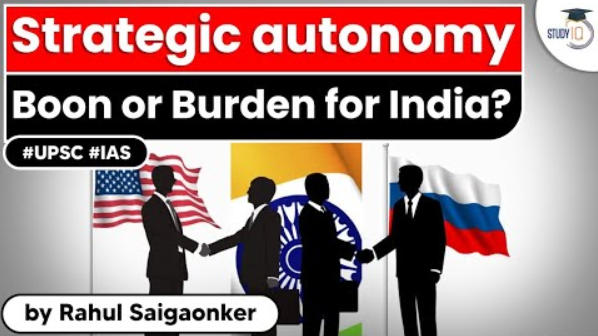Table of Contents
The Observation
Strategic Autonomy
India has been engaged in a recent flurry of diplomatic activity.
- India hosted
- Japanese Prime Minister Kishida Fumio (March 19)
- Chinese Foreign Minister Wang Yi (March 25)
- Russian Foreign Minister Sergey Lavrov (April 1)
- Virtual summit with Australian PM Scott Morrison (March 21) and UAE (Feb 18)
- In March 2022, India also hosted the foreign ministers of Austria, Greece, Oman, and Mexico, as well as the U.S. under-secretary for political affairs, EU special envoy for the Indo-Pacific, German national security advisor, U.K. foreign secretary, and U.S. deputy national security advisor Daleep Singh.
- Currently, India-US 2+2 dialogue is also underway.
Strategic Autonomy
- India meetings with the Japanese and Australian prime ministers and European and U.S. officials were aimed at securing New Delhi’s interests & participation in some sort of actions against Russia, including reducing Indian reliance on Russian military hardware and oil imports.
- Visits by the Chinese and Russian foreign ministers were aimed at maintaining India’s neutral stance and circumventing Western sanctions through a proposed ruble-rupee payments mechanism.
- Russian foreign minister Sergei Lavrov spoke of a “Eurasian Partnership” rooted in a common worldview by Moscow, Beijing, and New Delhi in the development of a multipolar world order and cooperation through regional initiatives such as the BRICS, China-India-Russia trilateral, and Shanghai Cooperation Organization (SCO).
Strategic Autonomy Boon or Burden?
- Despite these recent developments India risks becoming increasingly marginalized in an emerging global order marked by renewed bifurcation fueled by the Russian invasion of Ukraine and the China-U.S. strategic rivalry.
- New Delhi maintains lukewarm support to QUAD & remains unwilling to become enmeshed in more institutionalized regional initiatives like Five Eyes or AUKUS.
Strategic Autonomy Boon or Burden?
- India has been marginalized from many global flashpoints
- Had no place on table over Afghanistan issue.
- Had no place in P5 + 1 & Iran negotiations
- Now also, India could have played a bigger role in mediating between Russia & Ukraine but other middle powers, notably Turkey, France, and Israel, have assumed the mantle of leadership in driving efforts at a peace process.
- This brings us to a question – Is India Punching below its weight at global level?
Indian Leadership Needed
- Asian Relations Conference in 1947
- Eighteen Nations Conference in 1949 over Indonesia
- Neutral Nations Repatriation Commission 1953 in Korea
- International Control Commission on Indochina 1954
- Bandung Conference 1955 leading to Non-Aligned Movement
- Amitav Acharya:
- New Delhi appears to be still hamstrung by a vision deficit. At a time when many of the original ideas of India’s first Prime Minister Jawaharlal Nehru seem realizable, India seems to be still plagued by self-doubt and the burden of inherited ideologies.
Latest Burning Issues | Free PDF

























 WhatsApp
WhatsApp